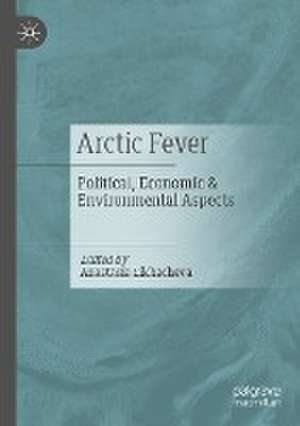Arctic Fever: Political, Economic & Environmental Aspects
Editat de Anastasia Likhachevaen Limba Engleză Paperback – 24 aug 2023
| Toate formatele și edițiile | Preț | Express |
|---|---|---|
| Paperback (1) | 899.87 lei 6-8 săpt. | |
| Springer Nature Singapore – 24 aug 2023 | 899.87 lei 6-8 săpt. | |
| Hardback (1) | 905.23 lei 6-8 săpt. | |
| Springer Nature Singapore – 23 aug 2022 | 905.23 lei 6-8 săpt. |
Preț: 899.87 lei
Preț vechi: 1097.41 lei
-18% Nou
Puncte Express: 1350
Preț estimativ în valută:
172.20€ • 180.61$ • 143.35£
172.20€ • 180.61$ • 143.35£
Carte tipărită la comandă
Livrare economică 01-15 aprilie
Preluare comenzi: 021 569.72.76
Specificații
ISBN-13: 9789811696183
ISBN-10: 9811696187
Ilustrații: XXIV, 566 p. 23 illus., 3 illus. in color.
Dimensiuni: 148 x 210 mm
Greutate: 0.7 kg
Ediția:1st ed. 2022
Editura: Springer Nature Singapore
Colecția Palgrave Macmillan
Locul publicării:Singapore, Singapore
ISBN-10: 9811696187
Ilustrații: XXIV, 566 p. 23 illus., 3 illus. in color.
Dimensiuni: 148 x 210 mm
Greutate: 0.7 kg
Ediția:1st ed. 2022
Editura: Springer Nature Singapore
Colecția Palgrave Macmillan
Locul publicării:Singapore, Singapore
Cuprins
Chapter 1. Introduction: The New Role of the Arctic Region.- Chapter 2. Russian Arctic Policy and Key Barriers for the Development in the Northern Latitudes.- Chapter 3. Development of the Northern Sea Route as a Eurasian Transport Corridor.- Chapter 4. Chinese Arctic Strategy: a Threat or Opportunity for Russia?
Notă biografică
Anastasia Likhacheva works as a Dean at the Faculty of World Economy and International Affairs at the Higher School of Economics (HSE) in Moscow, Russia. Her key area of expertise includes geo-economics with a particular focus on sanctions, Eurasian integration and Russian foreign policy in Greater Eurasia. She regularly prepares policy briefs for senior Russian public authorities and has been a member of expert working groups of the Ministry of Economic Development and the Ministry for the Development of the Russian Far East since 2014. She also co-leads the ThinkArctic Project within the Program of Russian Chairmanship in the Arctic Councli 2021-2023.
Textul de pe ultima copertă
This book explores the Arctic as a rapidly evolving phenomenon in international affairs of a rising number of stakeholders. For decades, Arctic studies used to be an affair of a relatively narrow group of experts from northern countries. This time is over due to a new Chinese Arctic policy, as well as growing regional interests from South Korea, Singapore, India and Japan. Contributors reflect on new roles for the Arctic region: both as a playground for the old school nation state competition and even confrontation, and a new source for international cooperation in energy, logistics and natural sciences. Climate change, political tensions and economic competition make Arctic a hotter venue of international relations. This new Arctic fever, studied through a comparative analysis of different regional agendas, especially with a focus on the US–China–Russia triangle, represents the main subject of our book, which will be of interest to scholars of geopolitics, of climate change, and of 21st century energy economics.
Anastasia Likhacheva works as a Dean at the Faculty of World Economy and International Affairs at the Higher School of Economics (HSE) in Moscow, Russia. Her key area of expertise includes geo-economics with a particular focus on sanctions, Eurasian integration and Russian foreign policy in Greater Eurasia. She regularly prepares policy briefs for senior Russian public authorities and has been a member of expert working groups of the Ministry of Economic Development and the Ministry for the Development of the Russian Far East since 2014. She also co-leads the ThinkArctic Project within the Program of Russian Chairmanship in the Arctic Councli 2021-2023.
Anastasia Likhacheva works as a Dean at the Faculty of World Economy and International Affairs at the Higher School of Economics (HSE) in Moscow, Russia. Her key area of expertise includes geo-economics with a particular focus on sanctions, Eurasian integration and Russian foreign policy in Greater Eurasia. She regularly prepares policy briefs for senior Russian public authorities and has been a member of expert working groups of the Ministry of Economic Development and the Ministry for the Development of the Russian Far East since 2014. She also co-leads the ThinkArctic Project within the Program of Russian Chairmanship in the Arctic Councli 2021-2023.
Caracteristici
Represents an attempt of comprehensive analysis of the Arctic as a rapidly evolving phenomenon in international affairs Aims to show the new Arctic to a broader audience Reflects new roles of the Arctic region
